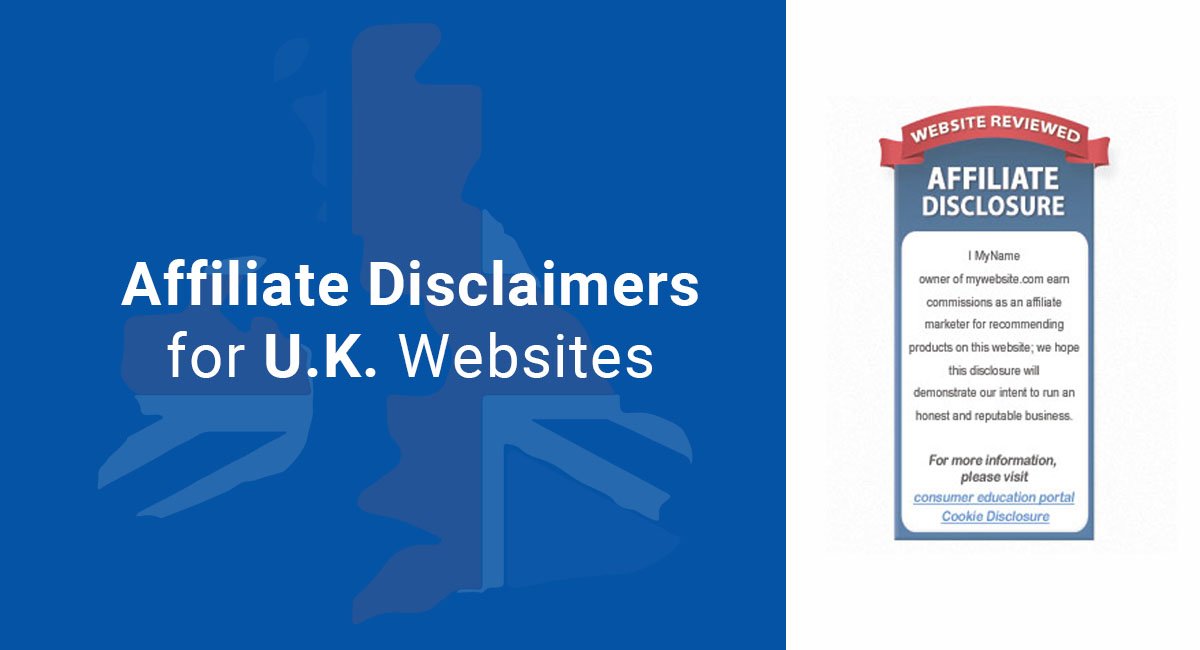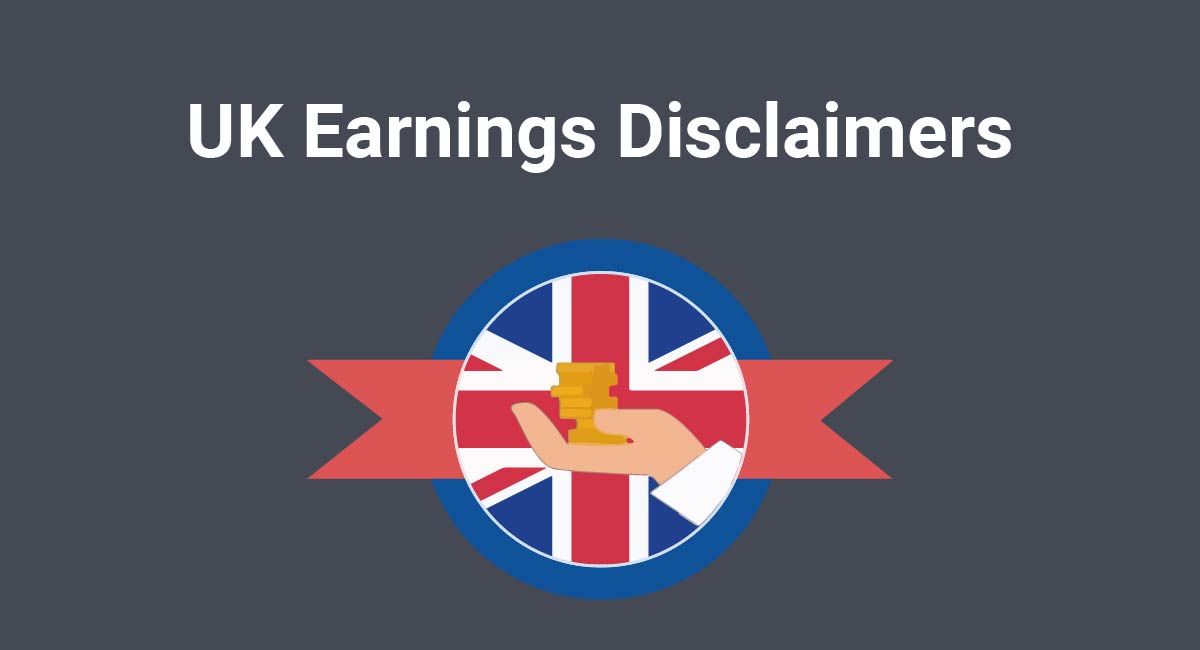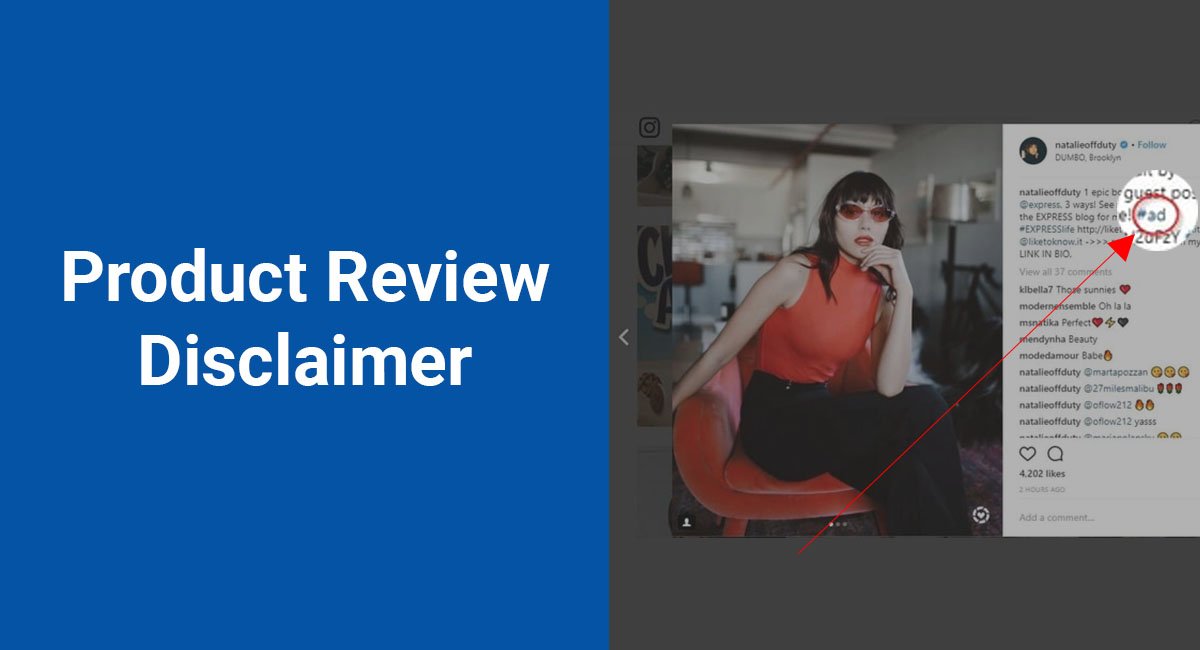Many website owners are aware of the Federal Trade Commission (FTC) guidelines regarding affiliate disclaimers. They often overlook the fact that these disclaimers are also required in the U.K. Looking over review sites that are exclusive to the U.K., many do not contain an Affiliate Disclaimer and that can lead to criminal penalties.
Fortunately, the U.K. law is much more general than FTC guidelines and chances are if you meet the FTC guidelines you will also meet the requirements for affiliate links used on your U.K. website. You still need to be cautious because the penalties are severe if authorities determine your affiliate website misleads customers.
Here is how to be upfront about any affiliate links and assure you present a truthful website.
Overview of the law
Many merchants, including Amazon, allow for affiliate relationships where a website owner can link to products and receive a commission when a user purchases it. This is a popular way for people to earning money on blogs and review sites. Laws in the U.S. address these marketing strategies by requiring website owners and bloggers to disclose these relationships through an Affiliate Disclaimer.
The U.K. endorses the same practice but more subtly through its current consumer protection laws.
Consumer protection regulations

In the U.K., the requirements for an affiliate disclaimer arise from the Consumer Protection from Unfair Trading Regulations 2008 (CPUTR 2008). Regulation Five under the act specifically prohibits providing misleading information to consumers.
This includes failing to inform consumers, too. The Affiliate Disclaimer reveals that your website is an affiliate site and consumers who use the links are providing commissions to you. Since there is a likelihood that these endorsements and links may influence consumer purchasing decisions, the web community concluded that Affiliate Disclaimers are necessary to promote truthful advertising and avoid trouble with trading regulations.
These rules apply to anyone who is a "trader" and that includes those marketing to U.K. customers from other countries.
Many website owners and bloggers who use affiliate links already have a disclaimer due to the U.S. FTC regulations. It is already apparent that if you use affiliate links to purchase U.S. products, you must have the Affiliate Disclaimer on that page. The same rules also applie if your website either reaches U.K. customers or you provide an affiliate link to a product limited to the U.K.
Penalties

The CPUTR 2008 contains criminal penalties for website owners who violate the act. When you fail to provide an Affiliate Disclaimer, your offense will fall under practices which impair a consumer's decision making ability or providing misleading information by omitting essential facts.
A first offense is met with a caution. U.K. authorities are not interested in punishing blog or website owners who make a first-time error.
Once you face a citation, you need to act quickly. Prosecution and fines are reserved for persistent violations, but if you fail to follow warnings, you can easily fall under that category. Because of this, it's important to know how to draft an Affiliate Disclaimer that keeps your website in line with U.K. law.
Meeting requirements
While the FTC has specific guidelines for Affiliate Disclaimers, there is no set policy in the U.K. It was the web industry that set its own standards and offered resources to consumers and website owners to assure compliance.
Transparency is the main goal of these standards. Not only does it prevent a website from being vague about affiliate relationships, but it is considered more ethical.
A company called MoreNiche.com is a health product distributor that is also a leader in helping website owners draft Affiliate Disclaimers. It started this as a way to keep its own affiliates ethical as blogs and personal websites started endorsing its products. These resources are now available to other companies.
On its website Affiliate Disclosure, MoreNiche.com offers guidelines for drafting these disclaimers. It suggests:
- Placing the disclaimer on every page where the site promotes a product or links to it in order to generate commissions,
- Making the Affiliate Disclaimer visible on first sight rather than forcing users to scroll down the page,
- Displaying your real full name or trade name, but no aliases, and
- Linking to Affiliate Disclosure's Consumer Education Portal.
The last element is not required. Examples listed later do not contain a link to that page. However, if you wish to be thorough, this is not a bad resource to include in your Affiliate Disclaimer.
This resource provides detailed information for users about how affiliate marketing works. The Consumer Education Portal starts with a quick definition describing this practice:

To provide more details to a user, it offers this flow chart as well:
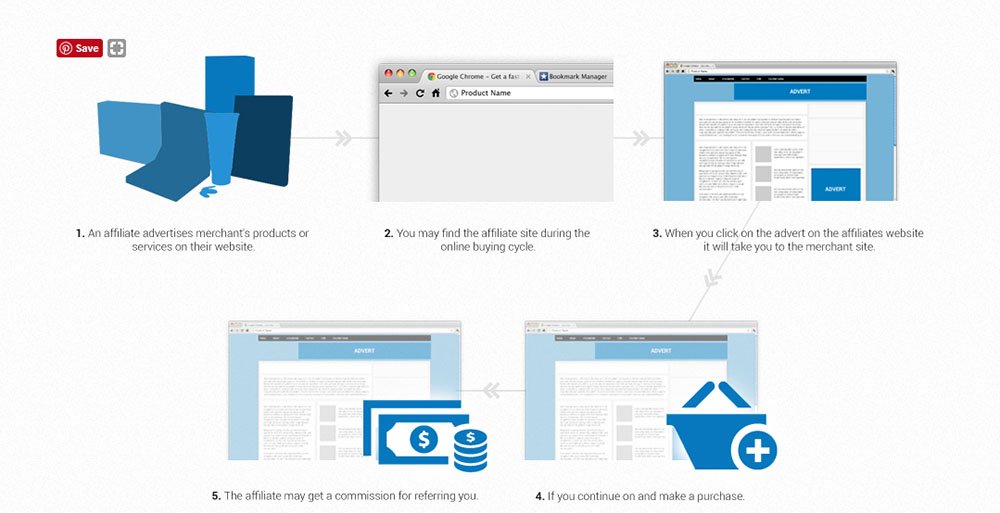
There is also a brief FAQ-style explanation:
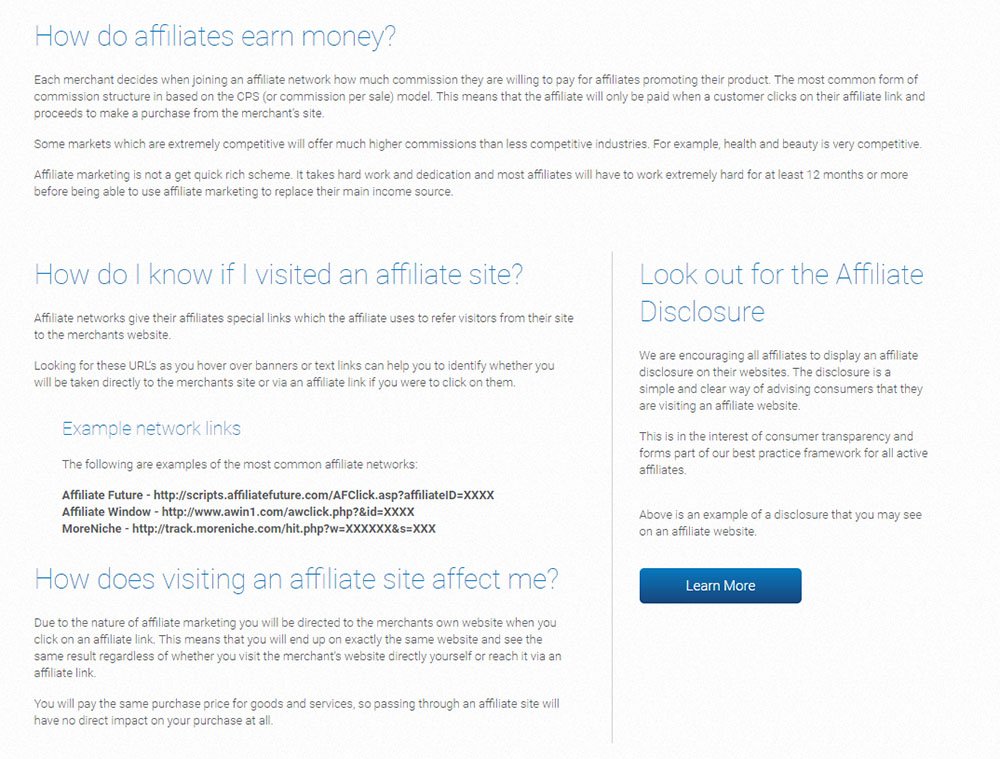
Providing a link to these resources ensures that a consumer has an opportunity to be educated about your affiliate practices and know how it works in general. This meets the burdens for truthfulness and transparency listed in Regulation Five of the CPUTR 2008.
Other bloggers and website owners prefer to offer clear Affiliate Disclaimers without links to outside pages. This is also adequate under U.K. law.
Examples
Websites and bloggers take many approaches to being upfront about their affiliate links. They offer disclaimers in plain language and provide contact information for users who have questions.
Affiliate Disclosure provides a template. It shows the name of the trader benefiting from the affiliate relationship and explains that commissions are involved. The disclaimer ends with a link to the above Consumer Education Portal:

Another resource from Affiliate Disclosure is badge generation. You can enter your details online and generate a badge that you can then attach to webpages that have your affiliate links:
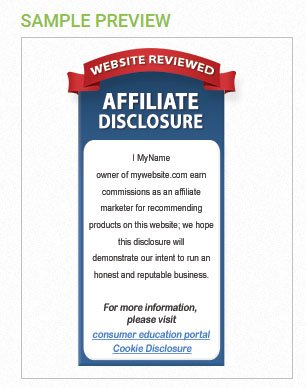
Other websites use open communication. UK Preppers uses plain language and details to be upfront with its customers. This disclaimer covers all the points listed above but there is no link to external pages like the Consumer Education Panel:
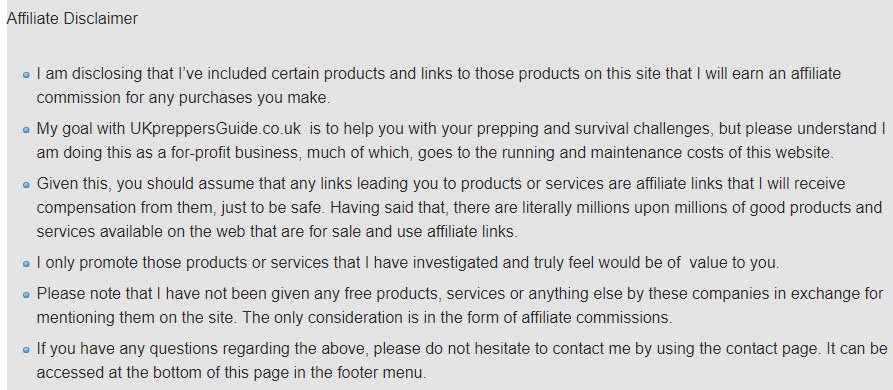
Affiliate Disclaimers can also be informal. A Mum Reviews is a product review site that often receives free items to try out and review. This is explained in the disclaimer and also includes the Amazon EU program Affiliate Disclaimer:
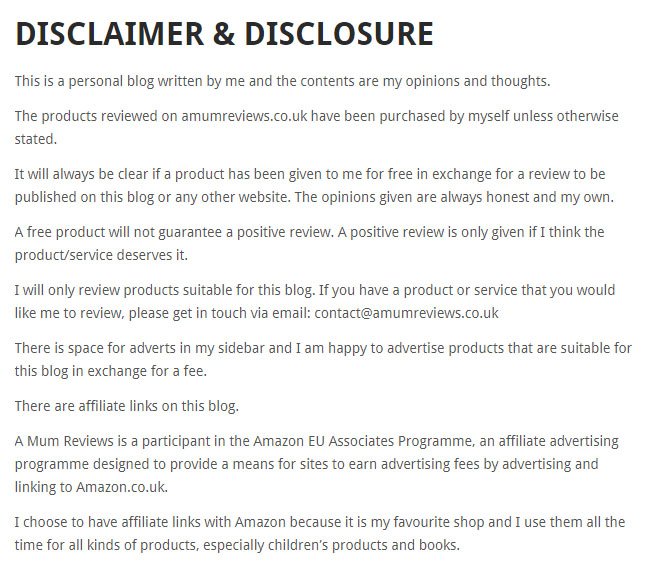
Websites that exist primarily on affiliate relationships have more involved disclaimers. This is the case of Clique Media, Inc. which maintains several websites which feature products from third parties.
Clique Media, Inc. focuses primarily on the FTC rules, which helps it meet the U.K. legal requirements as well. Its detailed disclaimer explains how it profits from these promotional campaigns and lists its affiliates:
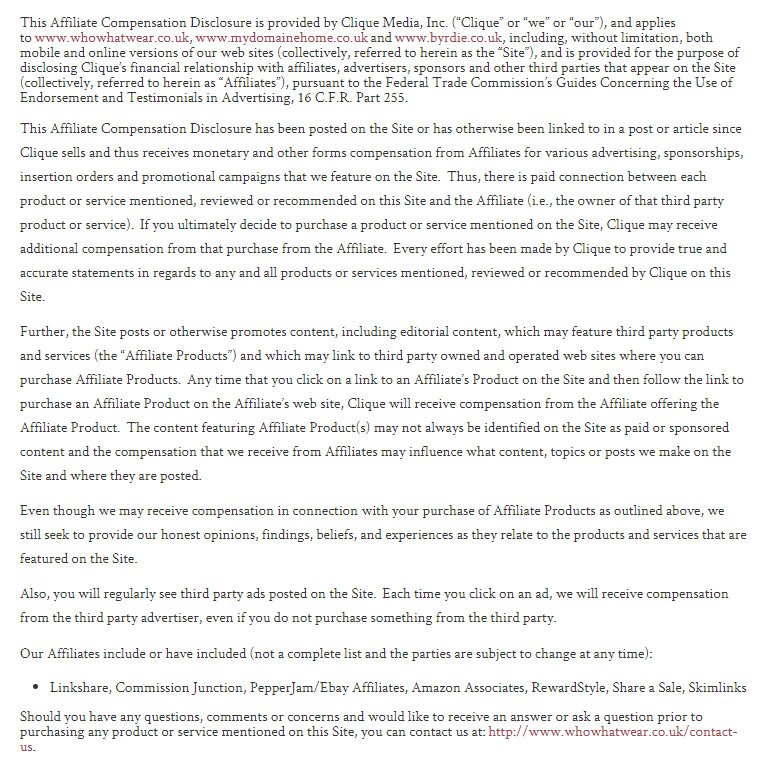
If you're following FTC rules and are fully compliant, you likely also meet the standards for the U.K. consumer protection laws. You just need to know that even if you are endorsing or linking to U.K.-only products, your responsibility to post an Affiliate Disclaimer remains. By following these guidelines and examples, you can meet that requirement and benefit from affiliate relationships in both the U.S. and U.K.

Comprehensive compliance starts with a Privacy Policy.
Comply with the law with our agreements, policies, and consent banners. Everything is included.
